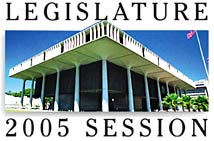Trauma specialist
shortages pose
crisis for state
A House bill would pay
for specialists in Queen's
understaffed emergency room
The state's only trauma center at the Queen's Medical Center is facing a crisis because of a lack of on-call specialists, Queen's executives told state lawmakers yesterday.
|
|
HB 1478 also calls for a study of the impact of the crisis on emergency medical services to residents, and what an appropriate government response should be. The bill now goes to the House Legislative Management and Finance committees.
Besides a highly skilled trauma team, the emergency room must be able to mobilize physicians from more than 20 specialties at a moment's notice, said Dr. Richard Friedman, Queen's vice president of medical affairs.
But only a limited number of neurosurgeons can participate in trauma calls, and the ER is having on-call problems with specialists in other areas, such as anesthesia, gastroenterology, hand surgery and orthopedics, Friedman said.
The crisis is nationwide, with some emergency rooms and trauma centers closing because they cannot maintain necessary staffing levels, he said.
He said Queen's has been covering the gaps, but it is "more and more of a struggle." Among the reasons, he noted:
» Physicians receive little or no reimbursement from government medical plans for on-call services, which require them to take time away from their own practices and patients.
» They have no prior relationship or knowledge of patients in ER, which increases risks of error in treatment.
» Malpractice insurers are threatening to stop coverage for physicians who provide trauma care, or else have increased premium costs, which can amount to hundreds of thousands of dollars for specialties.
» Younger physicians want to spend more time with their families.
"We rely on the good will of surgeons to step up. ... In 25 years nothing like this has happened before, when no one is available to step up."
Dr. Thomas O'Callaghan, associate medical director of trauma services, said Queen's admits about 1,600 trauma cases a year, with almost 200 from the neighbor islands.
Severely injured patients also are transferred to the trauma center every day from neighbor island hospitals that do not have the resources, staffing or technology to care for them, he said.
But state Health Department officials, supporting the appropriation for Queen's, said neighbor island physicians are having trouble transferring patients to the trauma center because of limited call coverage in areas such as orthopedics, neurology and general surgery.
Arthur Ushijima, president and chief executive of Queen's, said that without state assistance, the board will have to consider reducing the center's community services and programs, now costing more than $50 million.
He said the trauma program costs more than $32 million annually, with losses of $4.6 million, due mostly to increasing costs of on-call coverage.
Still, Queen's is committed to the trauma program, he said. "Without it, many lives would be impaired or lost. However, it needs funding support, and we must appeal to the people of Hawaii for help."
[News] [Business] [Features] [Sports] [Editorial] [Do It Electric!]
[Classified Ads] [Search] [Subscribe] [Info] [Letter to Editor]
[Feedback]

